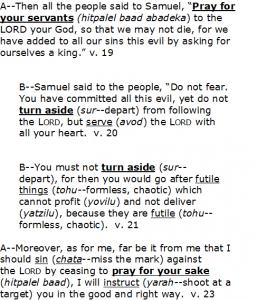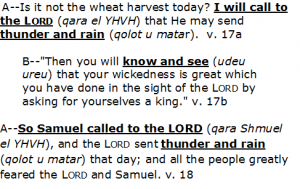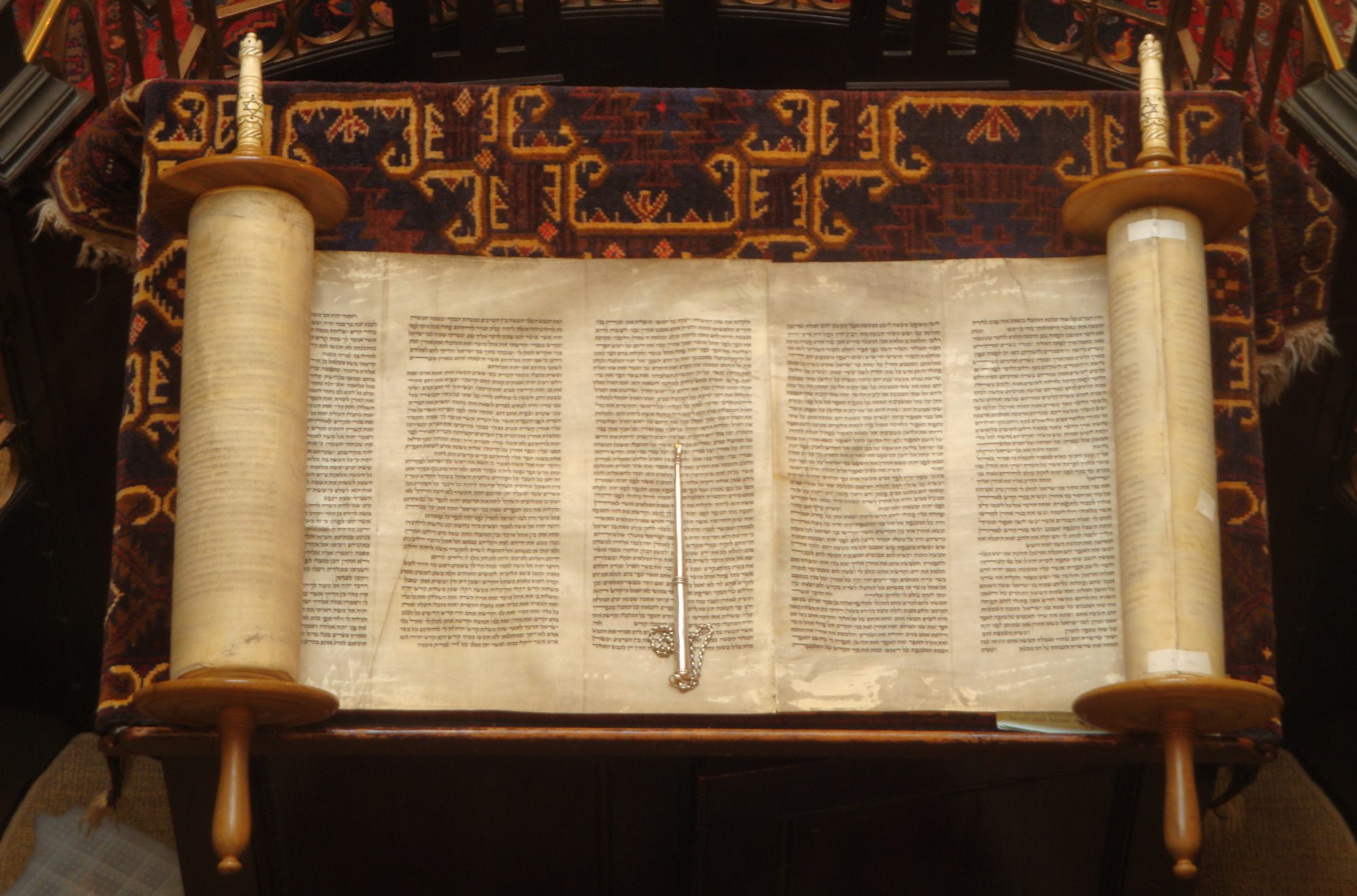
CHIASM, 1 SAMUEL 12:19-23

Explaining the Chiasm
Verses 19 and 23 share a phrase: hitpalel baad–“pray for your sake” or when followed by abadeka, “pray for (the sake of) your servants.” The theme here, therefore, is praying for others. Verses 20 and 21 also share a common word, sur, meaning to “turn from” or “depart.” What then does it mean to pray for someone else? Samuel provides an answer to this question, but perhaps not quite what many would have expected.
The conversation captured by this chiasm followed Samuel’s chastisement of the people for desiring a human king, all the while disregarding the rule of their rightful king–YHVH. In verse 12:7, Samuel told the people: “Now therefore stand that I may reason with you before the LORD all the righteous acts of the LORD that He did to you and to your fathers.” The word, reason, is the Hebrew, shaphat, meaning to judge. And the judgment was this: that though the LORD had acted on their behalf to bring them out of Egypt, “they forgot the LORD their God.” (1 Sam. 12:9) So the LORD sent judges (shoftim, meaning judges, the noun associated with shaphat) in the persons of Jerubbaal, Bedan (otherwise known as Balak), Jephthah and Samuel, who “delivered you from the hands of your enemies all around, so that you lived in security.” (1 Sam. 12:11)
The latest offense was Israel’s request for a king. “When you saw that Nahash the king of the sons of Ammon came against you, you said to me, ‘No, but a king shall reign over us, although the Lord your God was your king.” (1 Sam. 12:12) A chiasm just prior to the one we’re looking at demonstrated to the people that what they had done was wrong.

With this as a context, we now arrive at verse 19. The people, having witnessed the sign of the thunder and rain, now know and see that they have “added” (yasaph) to the evil sin they committed in requesting a king. They said to Samuel to pray for them (hitpalel baad) “so that we may not die.” And what prayer did Samuel pray? Did he fall to his knees, or face to the ground, and beg God to forgive Israel? His response started with two words: “Al tirau,” meaning “do not fear.” And he followed that with an instruction: “Do not turn aside (sur meaning depart) from following the LORD, but serve[1] (avod) the LORD with all your heart.” (v. 20) And in the very next breath, he again stated not to “turn aside, for then you would go after (achar) futile things.” What are futile things? In Hebrew, the word is tohu, the very same word found in Genesis 1:2–“the earth was tohu va bohu“–formless and void. In that same chapter, God made seven utterances–“vayomer Elohim“–and the world was brought into order. Man was then made in “the image of God”–tselem Elohim–with tselem pictographically meaning “the desire to control chaos.” Therefore, following the LORD brings order; departing or turning aside from the LORD brings tohu–chaos.
So, what was Samuel’s prayer? Did he go off somewhere to lift up his fellow Israelites to the LORD? There is nothing in this passage of Scripture bearing witness to anything like that. Rather, it simply states that Samuel resolved to instruct Israel in what was good and upright. And, if we take verses 20 and 21 into account, he told Israel not to “turn aside” from God, to follow the LORD, to serve the LORD with all their heart, to turn themselves toward the way and order of God, since to do otherwise would be “tohu“–chaos. That was Samuel’s palel–his prayer. Palal literally means to judge oneself, directing one’s heart and mouth to God. Samuel looked inside himself, aligned himself with the purpose for which God created man–the desire to control chaos–and issued a “call to action” for his fellow Israelites to do the same.
Is this what it means to pray for others? In the context of this Scriptural passage, yes. If this seems strange to us, it is because we are raised within the paradigm of associating prayer with its Latin root–precari, meaning entreat, ask or the bringing of a petition to God. Although this view of prayer–precari–has its own Biblical basis, to restrict our view of prayer to precari only narrows the means by which we enrich our relationship with God.
END NOTES
[1] This word, avod, meaning to serve or work, is first found in Genesis 2:5, “and there was no man to work the ground.” Man then is brought to life in Genesis 2:7. In Genesis 2:15, God put the man in the garden of Eden to avod (work), and keep (shamar–keep watch over) it.


